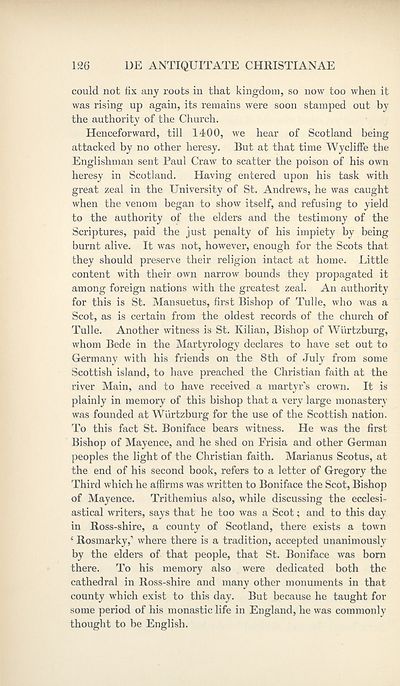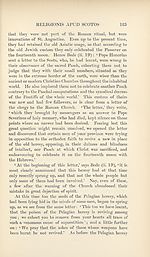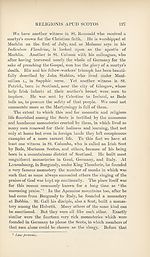Series 1 > Miscellany of the Scottish History Society (Second volume)
(151) Page 126
Download files
Complete book:
Individual page:
Thumbnail gallery: Grid view | List view

126
DE ANTIQUITATE CHRISTIANAE
could not fix any roots in that kingdom, so now too when it
was rising up again, its remains were soon stamped out by
the authority of the Church.
Henceforward, till 1400, we hear of Scotland being
attacked by no other heresy. But at that time Wycliffe the
Englishman sent Paul Craw to scatter the poison of his own
heresy in Scotland. Having entered upon his task with
great zeal in the University of St. Andrews, he was caught
when the venom began to show itself, and refusing to yield
to the authority of the elders and the testimony of the
Scriptures, paid the just penalty of his impiety by being
burnt alive. It was not, however, enough for the Scots that
they should preserve their religion intact at home. Little
content with their own narrow bounds they propagated it
among foreign nations with the greatest zeal. An authority
for this is St. Mansuetus, first Bishop of Tulle, who was a
Scot, as is certain from the oldest records of the church of
Tulle. Another witness is St. Kilian, Bishop of Wiirtzburg,
whom Bede in the Martyrology declares to have set out to
Germany with his friends on the 8th of July from some
Scottish island, to have preached the Christian faith at the
river Main, and to have received a martyr’s crown. It is
plainly in memory of this bishop that a very large monastery
was founded at Wiirtzburg for the use of the Scottish nation.
To this fact St. Boniface bears witness. He was the first
Bishop of Mayence, and he shed on Frisia and other German
peoples the light of the Christian faith. Marianus Scotus, at
the end of his second book, refers to a letter of Gregory the
Third which he affirms was written to Boniface the Scot, Bishop
of Mayence. Trithemius also, while discussing the ecclesi¬
astical writers, says that he too was a Scot; and to this day
in Boss-shire, a county of Scotland, there exists a town
i: Rosmarky,’ where there is a tradition, accepted unanimously
by the elders of that people, that St. Boniface was born
there. To his memory also were dedicated both the
cathedral in Ross-shire and many other monuments in that
county which exist to this day. But because he taught for
some period of his monastic life in England, he was commonly
thought to be English.
DE ANTIQUITATE CHRISTIANAE
could not fix any roots in that kingdom, so now too when it
was rising up again, its remains were soon stamped out by
the authority of the Church.
Henceforward, till 1400, we hear of Scotland being
attacked by no other heresy. But at that time Wycliffe the
Englishman sent Paul Craw to scatter the poison of his own
heresy in Scotland. Having entered upon his task with
great zeal in the University of St. Andrews, he was caught
when the venom began to show itself, and refusing to yield
to the authority of the elders and the testimony of the
Scriptures, paid the just penalty of his impiety by being
burnt alive. It was not, however, enough for the Scots that
they should preserve their religion intact at home. Little
content with their own narrow bounds they propagated it
among foreign nations with the greatest zeal. An authority
for this is St. Mansuetus, first Bishop of Tulle, who was a
Scot, as is certain from the oldest records of the church of
Tulle. Another witness is St. Kilian, Bishop of Wiirtzburg,
whom Bede in the Martyrology declares to have set out to
Germany with his friends on the 8th of July from some
Scottish island, to have preached the Christian faith at the
river Main, and to have received a martyr’s crown. It is
plainly in memory of this bishop that a very large monastery
was founded at Wiirtzburg for the use of the Scottish nation.
To this fact St. Boniface bears witness. He was the first
Bishop of Mayence, and he shed on Frisia and other German
peoples the light of the Christian faith. Marianus Scotus, at
the end of his second book, refers to a letter of Gregory the
Third which he affirms was written to Boniface the Scot, Bishop
of Mayence. Trithemius also, while discussing the ecclesi¬
astical writers, says that he too was a Scot; and to this day
in Boss-shire, a county of Scotland, there exists a town
i: Rosmarky,’ where there is a tradition, accepted unanimously
by the elders of that people, that St. Boniface was born
there. To his memory also were dedicated both the
cathedral in Ross-shire and many other monuments in that
county which exist to this day. But because he taught for
some period of his monastic life in England, he was commonly
thought to be English.
Set display mode to:
![]() Universal Viewer |
Universal Viewer | ![]() Mirador |
Large image | Transcription
Mirador |
Large image | Transcription
Images and transcriptions on this page, including medium image downloads, may be used under the Creative Commons Attribution 4.0 International Licence unless otherwise stated. ![]()
| Scottish History Society volumes > Series 1 > Miscellany of the Scottish History Society (Second volume) > (151) Page 126 |
|---|
| Permanent URL | https://digital.nls.uk/126948800 |
|---|
| Attribution and copyright: |
|
|---|
| Description | Over 180 volumes, published by the Scottish History Society, containing original sources on Scotland's history and people. With a wide range of subjects, the books collectively cover all periods from the 12th to 20th centuries, and reflect changing trends in Scottish history. Sources are accompanied by scholarly interpretation, references and bibliographies. Volumes are usually published annually, and more digitised volumes will be added as they become available. |
|---|


